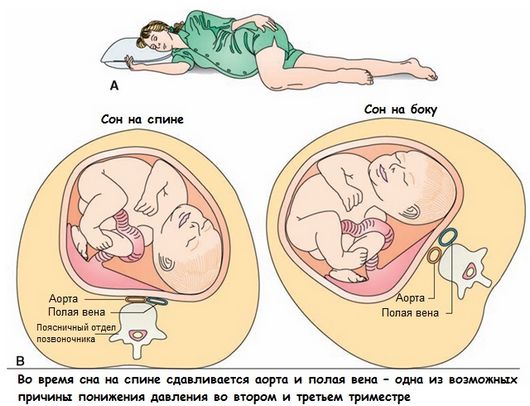Can a pregnant woman sleep on her back? - this is one of hundreds of questions that the expectant mother asks. After all, now a woman’s special condition forces her to reconsider her lifestyle and change many ingrained habits. The expectant mother feels responsible for the baby and tries to exclude everything from her life that could harm him.
Her favorite coffee and evening conversations with her friends over a glass of wine are banned. You will also have to forget about morning jogging and intense workouts in the gym for a while. A pregnant woman has to avoid stressful situations, move carefully, and get more rest. And even sleeping positions have their limitations. Now not only movements, but also the chosen position of the body during rest can affect the condition and development of the fetus.
Sleeping in your favorite position may become unavailable during pregnancy
Many pregnant women understand that it is important not to put pressure on their growing belly. Therefore, first of all, they are puzzled by the questions: how to sleep so as not to harm the child? What is the best position to choose to relax and have a good rest? Is it possible to sleep on your back?
Until about 11-12 weeks, the uterus is reliably protected by the pelvic bones. Its small size allows a woman to occupy any position during wakefulness and sleep without harm to the fetus.
But by about the middle of pregnancy, lying on your back is contraindicated. In this position, the enlarged uterus puts pressure on large vessels, impeding the supply of oxygen and necessary nutrients to the fetus.
How to sleep early
One of the first signs of pregnancy is drowsiness. Many women notice from the very beginning that they constantly want to sleep, regardless of the time of day. Gynecologists consider this condition to be normal and associate it with hormonal changes in the body. In addition, he now needs twice as much strength and energy. Don't deny yourself the desire to sleep. Sleep has a beneficial effect on a woman’s general well-being and the development of pregnancy.
In the first three months, the expectant mother does not have to worry about choosing the right sleeping position. At this time, resting on the side, on the stomach and on the back will not affect the condition of the baby in any way. By the end of the 12th week, the uterus has a length of no more than 12 - 12.5 cm. It is located in a secure shelter, behind the pelvic bones.

A baby in the first trimester is still very small and sleeping in any position will not harm him
Despite the absence of prohibitions, many women from 4-5 weeks of pregnancy cannot sleep on their stomachs due to increased sensitivity and soreness of the mammary glands. And the manifestations of early toxicosis do not allow lying on your back. This position increases nausea and dizziness. Therefore, you have to immediately get used to sleeping on your side. This is a universal position for all three trimesters.
SLEEP RULES DURING PREGNANCY
To ensure the normal development of the baby, the expectant mother during pregnancy is recommended to follow a number of rules:
- exclude sleeping in a supine position, starting from the first trimester, since adjustment after the 12th week represents additional stress during pregnancy;
- at the first signs of fatigue, you should rest: in this case, the optimal position is considered to be safe for the embryo and comfortable for the mother;
- at a certain stage of gestation, you need to forget about resting in positions lying on your stomach or back: there is a danger to the development of the fetus and the health of the mother;
- It is necessary to avoid sleeping in a stomach-up position, not only at night, but also during short rests.
How to sleep in early pregnancy
Gynecologists note increased sleepiness in women during pregnancy, associated with hormonal changes.
From the point of view of the physiological effect on the development of the fetus during the first trimester of gestation, sleeping on the back does not cause harm.
- At this time, the embryo is small, the size of the uterus does not exceed 12–12.5 cm, and it itself is securely hidden behind the bone structures of the pelvic organs, so any change in the position of the mother’s body does not affect the development of the fetus.
- From the psychological side, it is easier and more correct for a woman to adjust to resting in safe positions already at this stage.
- It is recommended that the expectant mother accustom herself to the fact that soon there will be only two acceptable sleeping positions - on the right and left sides.
- Despite the absence of prohibitions, many expectant mothers avoid resting on their stomachs from 4–5 weeks, explaining this by hypersensitivity of the mammary glands and the appearance of pain while sleeping in this position.
- At the same time, they avoid sleeping in a supine position due to the symptoms of early toxicosis, expressed in dizziness and nausea.
Important! Doctors strictly prohibit pregnant women in the second and third trimesters from sleeping on their backs, because... you can get a lot of side effects.
How to sleep in late pregnancy
Obstetricians are unanimous in their opinion that from what week a pregnant woman should not rest or sleep in a supine position: this is the 195th day of gestation.
One of the most correct positions to prevent the listed negative consequences is resting on your left side. This position is most preferable for the proper development of the baby.
If the baby's position is incorrect, gynecologists advise sleeping on the side on which the fetal head is located. This increases the chances for the baby to find the correct position and for a successful birth.
So, starting from the 28th week of pregnancy in the 3rd trimester, when asked whether pregnant women can sleep or rest on their backs, obstetricians answer with an unequivocal prohibition.
Note! Obstetricians prohibit expectant mothers from sleeping on their backs after 28 weeks, and women who are predisposed to the appearance of edema, varicose veins and thrombosis during the entire period of gestation.
How to sleep late in life
By the time you reach the second trimester, sleeping on your side should become a habit. You can no longer turn around on your barely rounded tummy. The fundus of the uterus after 14-15 weeks begins to extend beyond the pelvic bones. If you lie on your stomach, there is a high risk of inadvertently injuring your baby. Even though the baby is surrounded by amniotic fluid, you should not put him in danger. In addition, strong compression of the uterus can cause increased tension and contraction of its walls. Which leads to the threat of miscarriage or premature birth. And after 30 weeks, lying on your stomach simply won’t work, due to its large size.
In the second trimester, you should not lie on your back for a long time. The uterus already has a decent weight. The pregnant woman feels pressure on the internal organs and surrounding tissues. By week 20, unpleasant phenomena such as lower back pain and constipation may appear. During this period, if a woman sleeps on her back, the uterus puts pressure on the largest vein in the body.
We meet deadlines
When wondering whether it is safe for pregnant women to sleep on their back, the first thing to consider is which trimester you are in. If the pregnancy is only 1-2 months, then there is no reason to worry. In the first trimester, you are allowed to stay in the position that has always been the most comfortable. At this time, it does not matter whether a woman usually sleeps on her back or on her stomach, because the fetus is well protected by the pelvic bones, its size is small, and an incorrect position will not cause any harm to either the mother or the embryo. Therefore, there are no prohibitions for a pregnant woman to lie down.
In the second trimester the situation changes. The fetus grows, and when the woman lies down, it begins to put pressure on her internal organs. Therefore, many are interested in how long, or more precisely, from what week, you can’t sleep on your back.
Among doctors, it is generally accepted that it is absolutely safe for pregnant women to sleep on their back until about 28 weeks inclusive.
And then a long rest in this position will provoke:
- the appearance of edema (as the load on the kidneys increases);
- increased intestinal problems (bloating, increased gas formation);
- back pain;
- increased frequency of urination (as the uterus puts pressure on the bladder);
- problems with veins (varicose veins, hemorrhoids).

But the biggest trouble that can await a woman who is used to sleeping on her back during pregnancy is excessive compression of the vena cava running along the spine.
USEFUL INFORMATION: Insomnia in early pregnancy
At what time the troubles described above can occur - already in the second or only in the third trimester, there is no exact data. Doctors can only guess until approximately how long it is completely safe to lie on your back. Each pregnancy has its own characteristics; a woman should observe her feelings herself, and then she will be able to give up the “harmful” position in time.
Most often, the child helps to understand this - when the expectant mother takes an undesirable position, he begins to feel discomfort, actively moves, and prevents the woman from falling asleep.
Why is it dangerous to sleep on your back later in life?
A large vessel takes a major part in blood circulation, supporting the normal functioning of the pelvic organs.
Compression of the vena cava leads to stagnation of blood in the lower part of the body, disrupting the functioning of the entire circulatory system as a whole. This phenomenon has an extremely adverse effect on the health of mother and baby.

Position of the vena cava when sleeping on your back and side
In recent months, in a supine position, pregnant women notice poor health, shortness of breath and increasing fetal activity every minute. Which indicates a lack of oxygen. Therefore, the question of whether a pregnant woman can lie on her back no longer arises. The woman herself feels that it is impossible to rest in such a position in the third trimester.
Pregnancy and the prohibition of lying on your back
Why shouldn't pregnant women sleep on their backs?
Long and sound sleep is the key to good health. Full sleep is especially necessary for pregnant women, as it brings rest and relaxation. In the first trimester, a woman sleeps a lot, as the relaxing effect of progesterone greatly contributes to this. But in the second and especially the third trimesters, a woman’s sleep is rarely restful. This is due to the fact that a growing uterus and a mobile child make it difficult to find a comfortable sleeping position. Moreover, doctors do not allow you to sleep in your favorite positions. True, they explain quite clearly why pregnant women should not sleep on their backs.
The uterus becomes larger over time. Her weight increases due to the growth of the myometrium, an increase in the volume of amniotic fluid, the placenta and the weight of the fetus itself. The result is quite an impressive figure. It is because of the growth of the uterus that a woman experiences most of the unpleasant symptoms that occur during pregnancy. Doctors do not allow sleeping on your back after 20 weeks, because the uterus in this position puts pressure on the inferior vena cava. This is a very large vein that collects blood from the lower extremities and pelvic organs and carries it to the heart.
- If a vein is compressed, blood flow is disrupted. First of all, this can negatively affect the condition of the fetus. He begins to suffer from hypoxia, since the outflow of venous blood is slowed down, which means the influx of arterial blood is weakened. Often women, lying on their backs, feel dizzy, short of breath and increased heart rate. Some even lose consciousness, but this happens over long periods of time. The listed symptoms arise due to compression of the inferior vena cava.
If a woman is prone to varicose veins, then the likelihood of enlarged veins in the legs increases. This, in turn, leads to additional complications, since varicose veins are not recommended during pregnancy. Stagnation of blood leads to edema, which adversely affects a woman’s well-being. Gynecologists recommend constantly wearing compression stockings, and even during childbirth, do not forget to use an elastic bandage on your shins.
The second reason that explains why pregnant women should not sleep on their backs is compression of the ureters. These are two thin tubes that extend from the kidneys and carry urine to the bladder. If the baby's head is nearby, then when lying on his back, it can put pressure on the ureter. As a result, urine will stagnate in the kidneys, which will lead to serious complications. Inflammation begins, which can be of varying degrees of severity. Sometimes it is detected only by urine tests. And sometimes the temperature rises, lower back pain begins, and tests show that the condition is extremely serious.
Based on all of the above, you should not neglect the advice of doctors that sleeping on your back is undesirable. Many women make excuses by saying that their baby prevents them from sleeping on their side, but when they lie on their back, everything is calm. But the absence of clear symptoms does not mean that nothing is happening. Therefore, to prevent such complications, you should sleep only on your side.
What is the best sleeping position to choose?
The most suitable option for any stage of pregnancy is to sleep on your side, periodically turning in one direction or the other. And if you place a pillow under your back and between your knees, your sleep becomes more sound and less interrupted during the night. And the circulatory system functions normally, ensuring the timely supply of oxygen to the fetus and the removal of waste and toxins from the body.
It is advisable to be on your left side most of the time. It is clear that you won’t be able to sleep in one position for a long time; your legs and arms will become numb. But if possible, you should turn to the left side more often. In this way, the pressure of the growing uterus on the liver can be eliminated.
If at the next appointment the doctor discovers the transverse position of the fetus in the uterus, there is a way to change the situation. The baby can be forced to turn into the desired position. It is necessary to carefully lie down on the side towards which its head is turned. In most cases, this option works.
From 5-6 months, it is advisable to acquire special pillows for pregnant women. They will help relieve stress on the back, give the mother the opportunity to take a comfortable body position and relax. You can use several ordinary pillows for these purposes, but specially designed models are still better and more comfortable.
What is affected by body position?
The choice of position for rest and sleep can influence the development of pregnancy and the well-being of the fetus from about 12-13 weeks. At this time, the size of the uterus reaches such values that it can no longer be completely protected by the pelvic bones. After another couple of weeks, the midwife will be able to feel the fundus of the uterus. It will be located approximately halfway between the navel and the pubic bone. At this stage, lying on the stomach becomes uncomfortable for the woman herself. She experiences discomfort and unpleasant sensations in the lower abdomen. This position at 14-15 weeks will not cause direct harm to the baby, but can lead to uterine hypertonicity. And this is already a threat to the normal bearing of the baby.
When a woman lies on her back at 15-16 weeks, this has little effect. The uterus is not big yet. But by 19-20 weeks, this position of the body is reflected in the functioning of the internal organs.
Every day, the enlarged uterus puts more and more pressure on the intestines, bladder and other organs.
Hence the frequent urge to urinate, swelling in the lower extremities, constipation, and flatulence. “Aching” back pain appears due to the increasing load on the spine. If a woman lies on her back in the second or third trimester and remains in this position for some time, she experiences a number of unpleasant phenomena. There is a feeling of stuffiness, it seems that there is not enough oxygen, you feel dizzy and your vision begins to darken. It becomes impossible to take a slow, deep breath, beads of sweat appear, and your heart rate increases.
Such problems arise due to strong compression of the vena cava, which ensures the outflow of blood from the lower half of the body to the main organ - the heart. Oxygen slowly enters the blood, which leads to malfunctions and disruptions in the functioning of the entire body.
In this case, the baby also suffers. Due to circulatory disorders, fetal hypoxia may develop. The child in such a situation lacks oxygen and nutrients. Such a violation leads to weight loss and various pathologies in the development of important internal systems. First of all, the nervous system of the baby is affected. The baby born later will grow poorly and gain weight slowly. Children who have experienced hypoxia in the womb become restless and are delayed in development.

It is best to sleep on your side using special pregnancy pillows
Sleeping on your side prevents all of the problems described above. A pregnant woman does not experience any discomfort. The uterus does not create additional stress on surrounding organs. The child receives full oxygen and nutrients necessary for full development.
A few tips for getting a good night's sleep
- It is better not to take sleeping pills unless prescribed by a doctor;
- It is advisable to go for a walk in the evening before going to bed and breathe fresh air;
- it is important to ventilate the room daily, especially at night;
- It is necessary to change bed linen more often. Fresh-smelling pillowcases and sheets are the perfect mood for bed;
- It is advisable not to eat heavy or fatty foods 2 hours before bedtime;
- You can’t drink coffee or strong black tea at night;
- 3 hours before going to bed, you need to reduce your fluid intake;
- To get rid of insomnia, it is important to follow a routine. Go to bed and get out of bed every day at a certain time;
- If cramps prevent you from getting a full night’s sleep, you need to tell your doctor about it during your next visit. He will prescribe the necessary vitamins and minerals to eliminate the symptom;
- if your sleep is interrupted by disturbing thoughts and experiences, try talking to your mother or friend. In special cases, it would not hurt to consult an experienced psychologist.
A correctly chosen position is the basis for a full, healthy sleep. Doctors do not recommend sleeping on your back in the second half of pregnancy. If you always fall asleep only in this position, you need to radically change your habit from the beginning of pregnancy. From the first months, try to sleep on your side, fixing a comfortable position with special pillows and bolsters.










